The Passing
The site-specific sound installation “The Passing” creates an artificial chorus of human and non-human laments, performing a generative and continuously changing piece. Drawing on Epirotic laments from the area of Pogoni, and utilizing algorithmic sound synthesis techniques and machine learning, the southern gate of the Castle of Ioannina becomes a space where past and future sorrows become vocalized, in an effort to empower voices that are commonly excluded from the archive of humanist political economy and from the voice datasets.
The work was commissioned by Onassis Stegi for the exhibition Plásmata II: Ioannina - Human, strange, digital, metaphysical, that took place at the Castle of Ioannina in Epirus, Northwest Greece in June/July 2023.
The Passing is a collaborative project of the collective Maenads.
Maenads is a growing collective and a platform for sonic, visual, performative, and text-based projects. On this occasion, it was inhabited by Eleni Ikoniadou, Aliki Leftherioti, and Afroditi Psarra.
Conceptual Axis
In Western discourse, the voice has largely been interpreted as a cue to interiority, essence, and individuality. But the polyphonic lament of the people of Epirus (moiroloi) might be said to constitute a fundamentally subversive act: a pluralising and collective device trying to imagine a counter-aesthetic to Eurocentric modes of living and being.
The site-specific sound installation Passing, creates a chorus of many voices, from human and non-human laments, performing a month-long generative piece. Drawing on Epirotic laments from the area of Pogoni, and utilising current machine learning and voice synthesis technologies, as well as algorithmic sound synthesis techniques, the South gate of the Castle of Ioannina becomes a space where real, imaginary, and speculative past and future sorrows become vocalised.
A polyphonic strategy for producing and sharing alternative kinds of knowledge from the margins, voices that are commonly excluded both from the archive of humanist political economy and from the voice datasets and speech communication systems currently being built.
Two of the most fundamental characteristics of the lament that we wanted to emphasize on were: the role of the female voice, and that is why we worked specifically with polyphonic songs from Pogoni, as while the ensembles are composed of both women and men, the first voice is usually female, and the thematic of the songs of a place that has a particular history, as they speak of mourning, of loss, of uprooting, of loss, of exile, of marriage, of life processes that express some kind of transition. And the title of the work, The Passing, refers to such transitions, both metaphorical and literal.
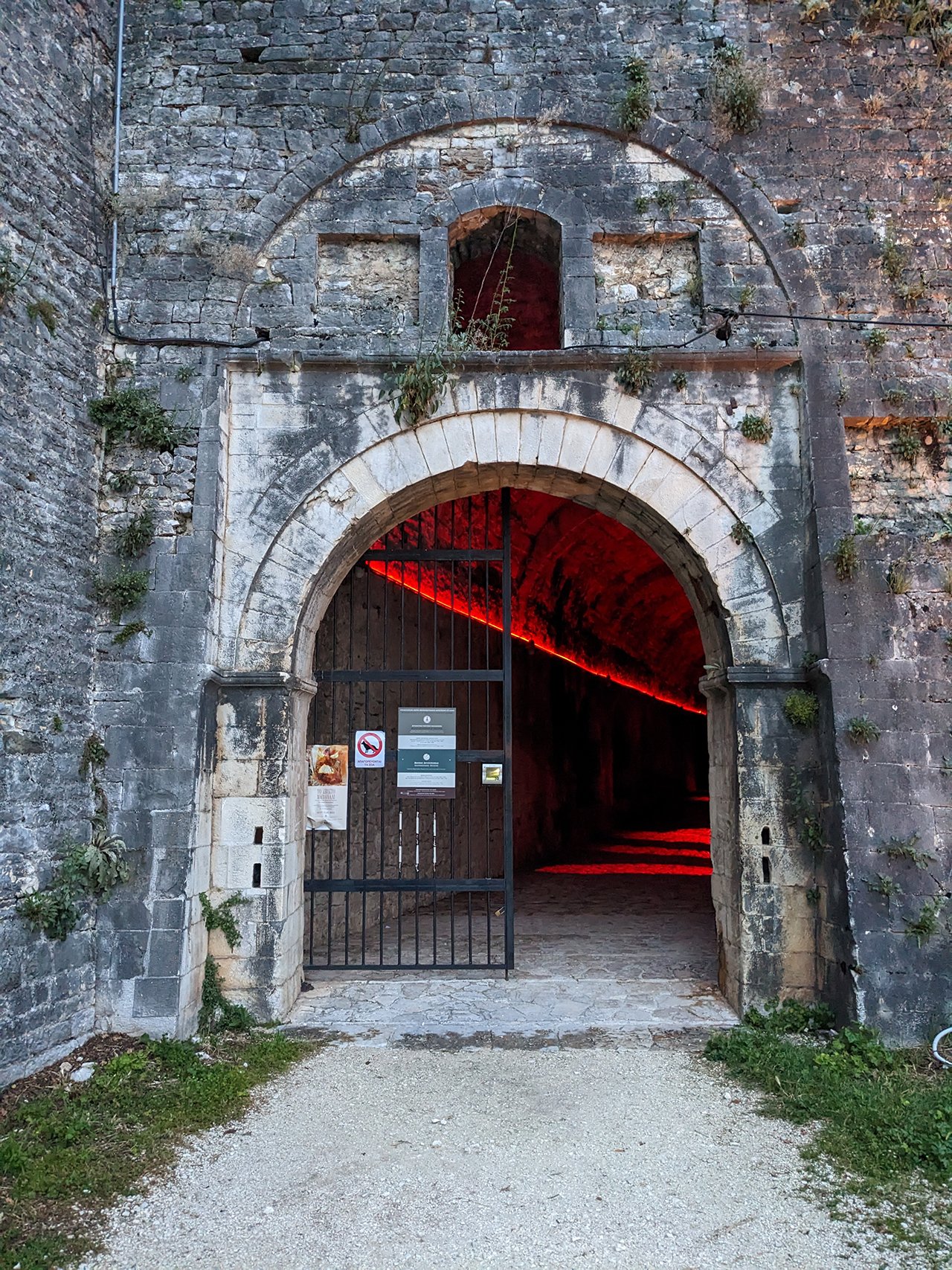
South gate of the Castle of Ioannina (The Passing entrance). Photo taken by Maenads.

The Passing interior. Photo taken by Maenads.
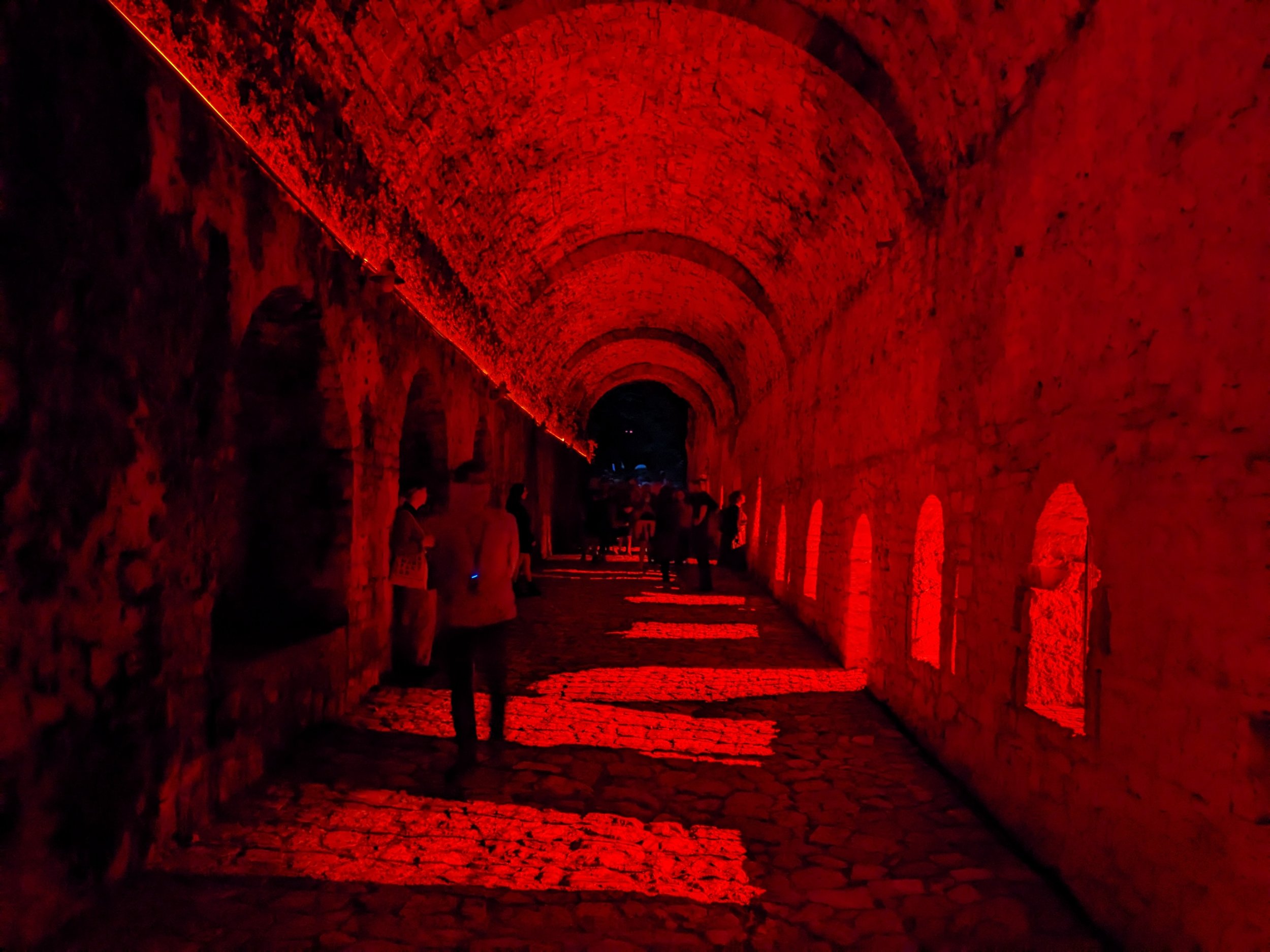
The Passing interior. Photo taken by Maenads.
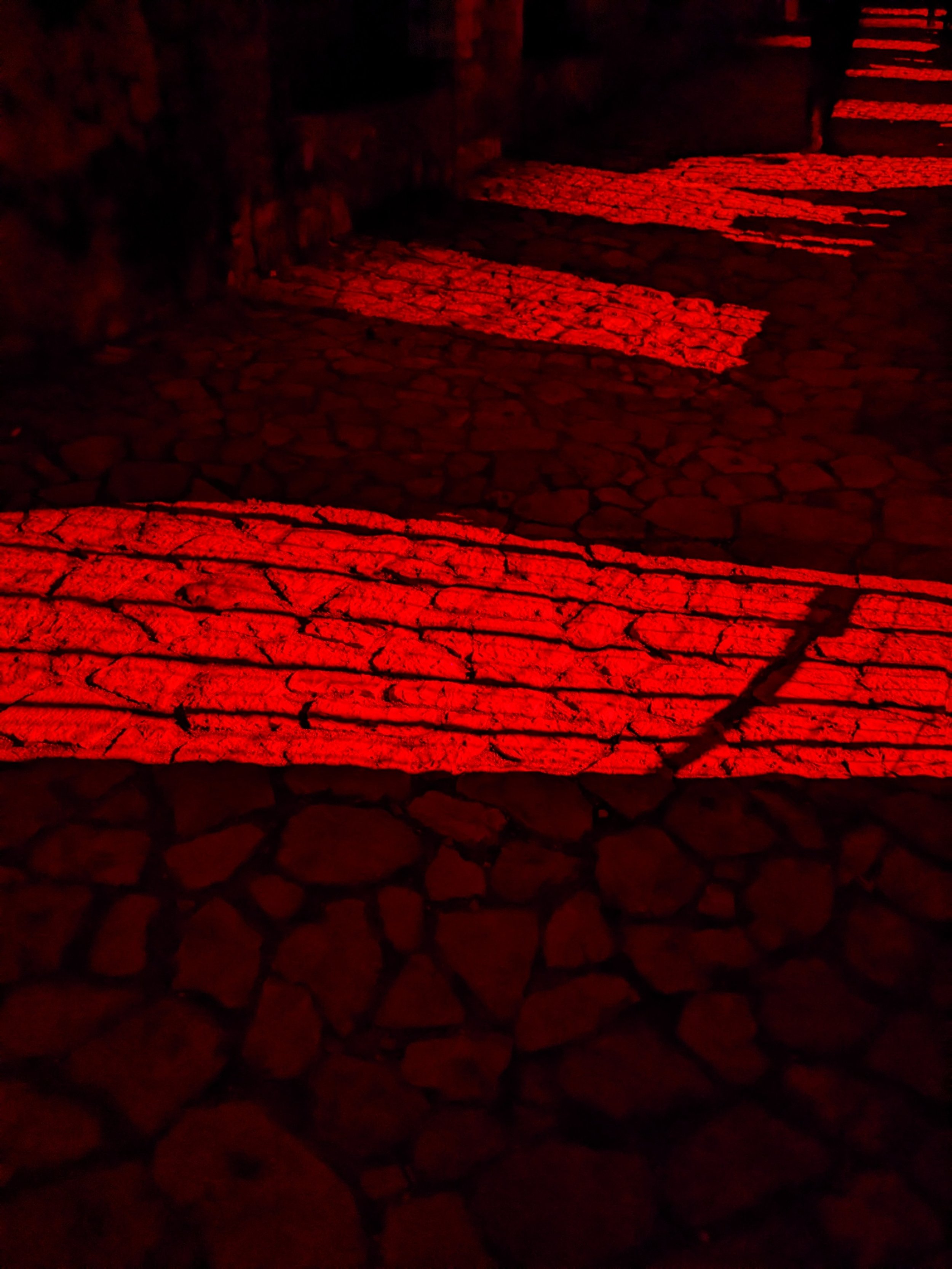
The Passing interior. Photo taken by Maenads.
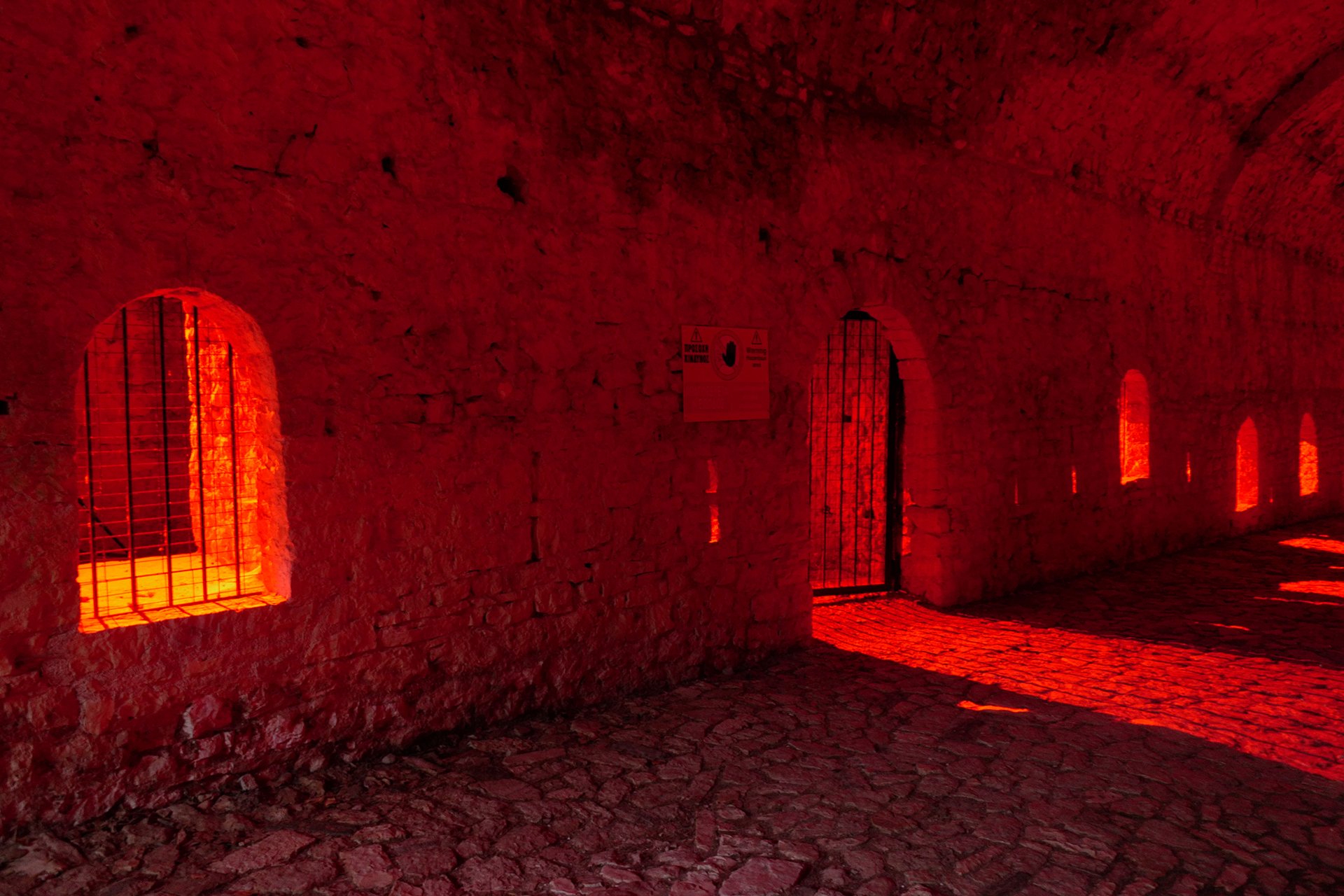
The Passing interior. Photo taken by Maenads.

The Passing interior. Photo taken by Maenads.

The Passing interior. Photo taken by Maenads.
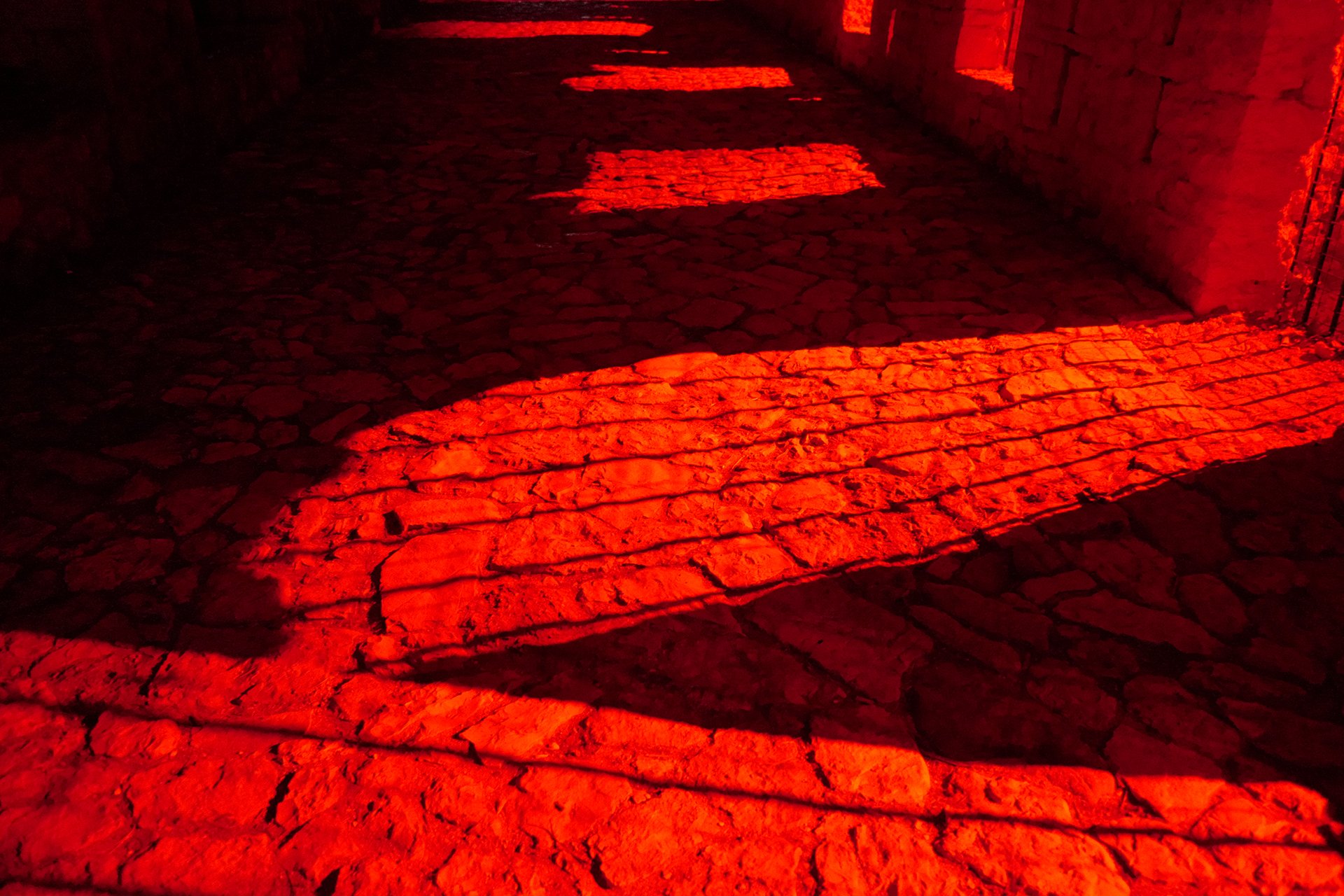
The Passing interior. Photo taken by Maenads.

The Passing interior. Photo taken by Maenads.
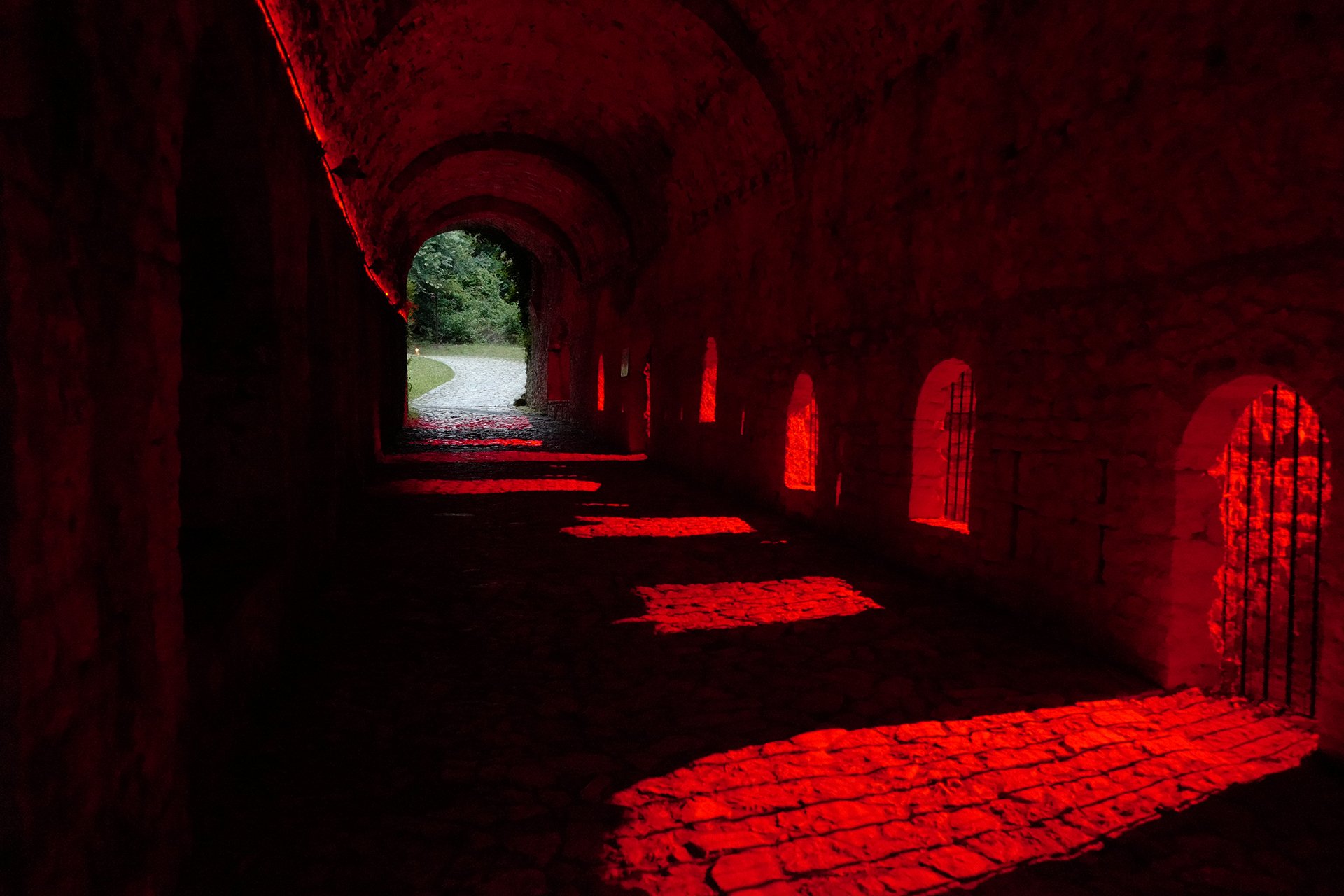
The Passing interior. Photo taken by Maenads.
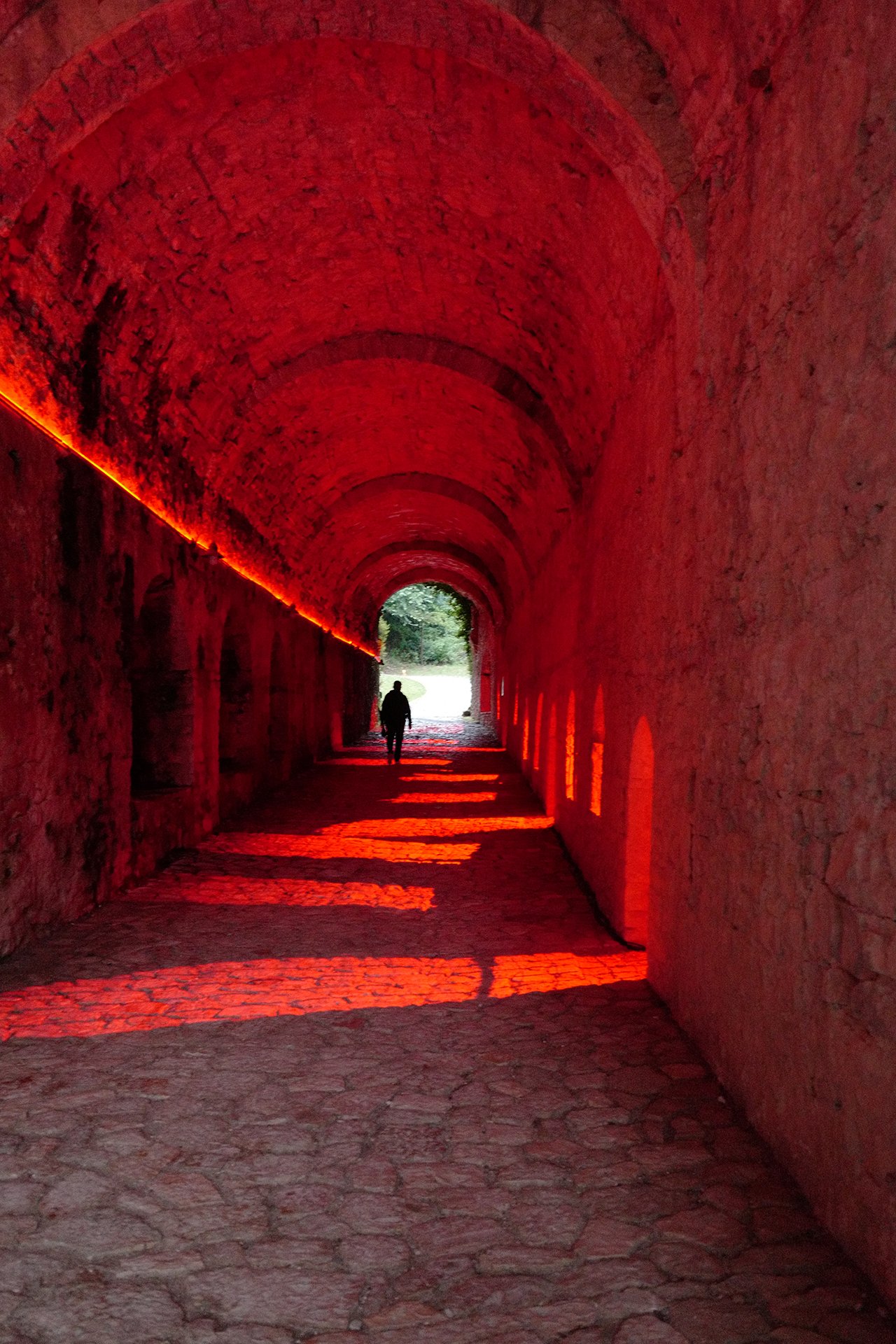
The Passing interior. Photo taken by Maenads.
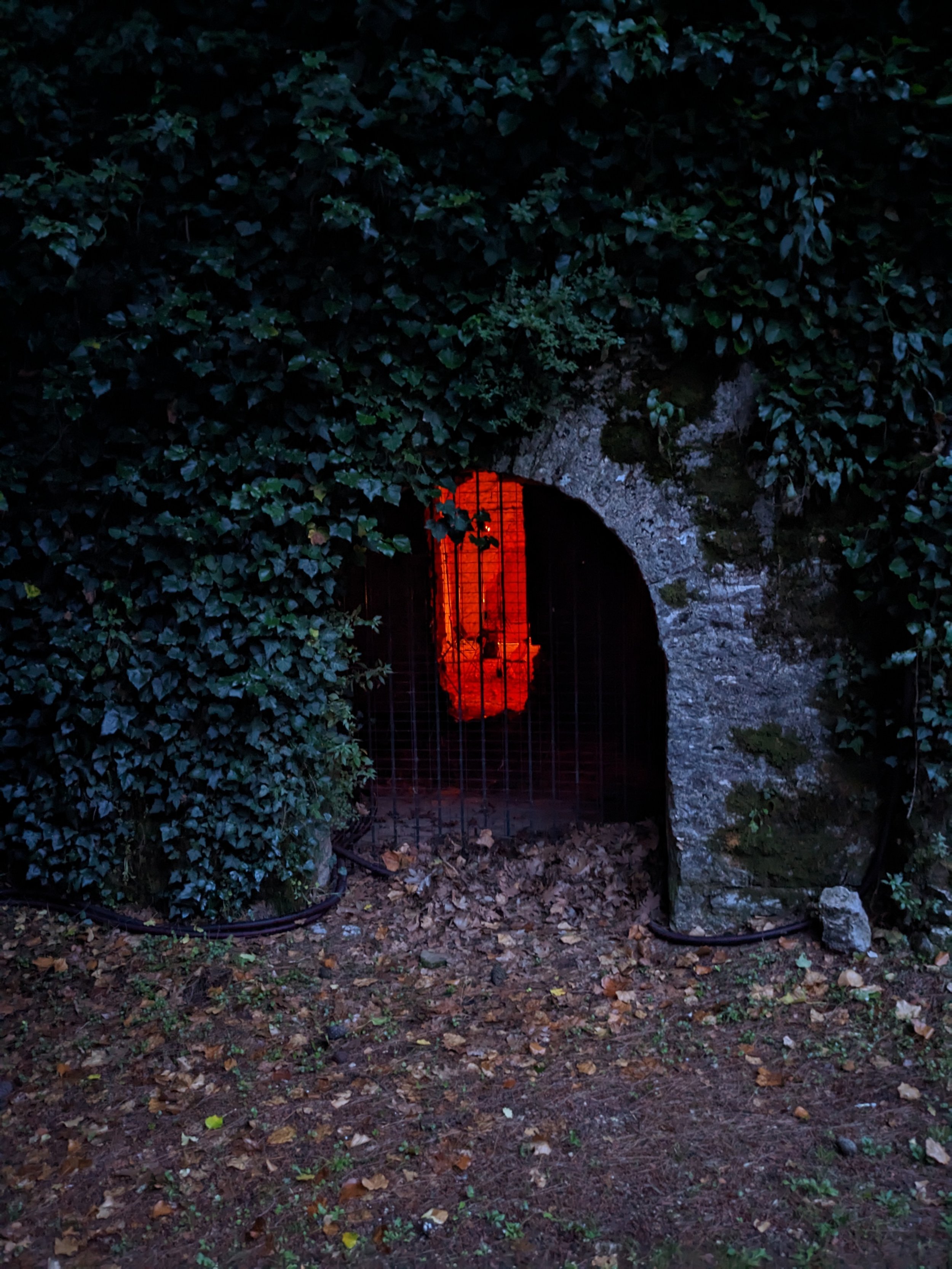
The Passing exit. Photo taken by Maenads.
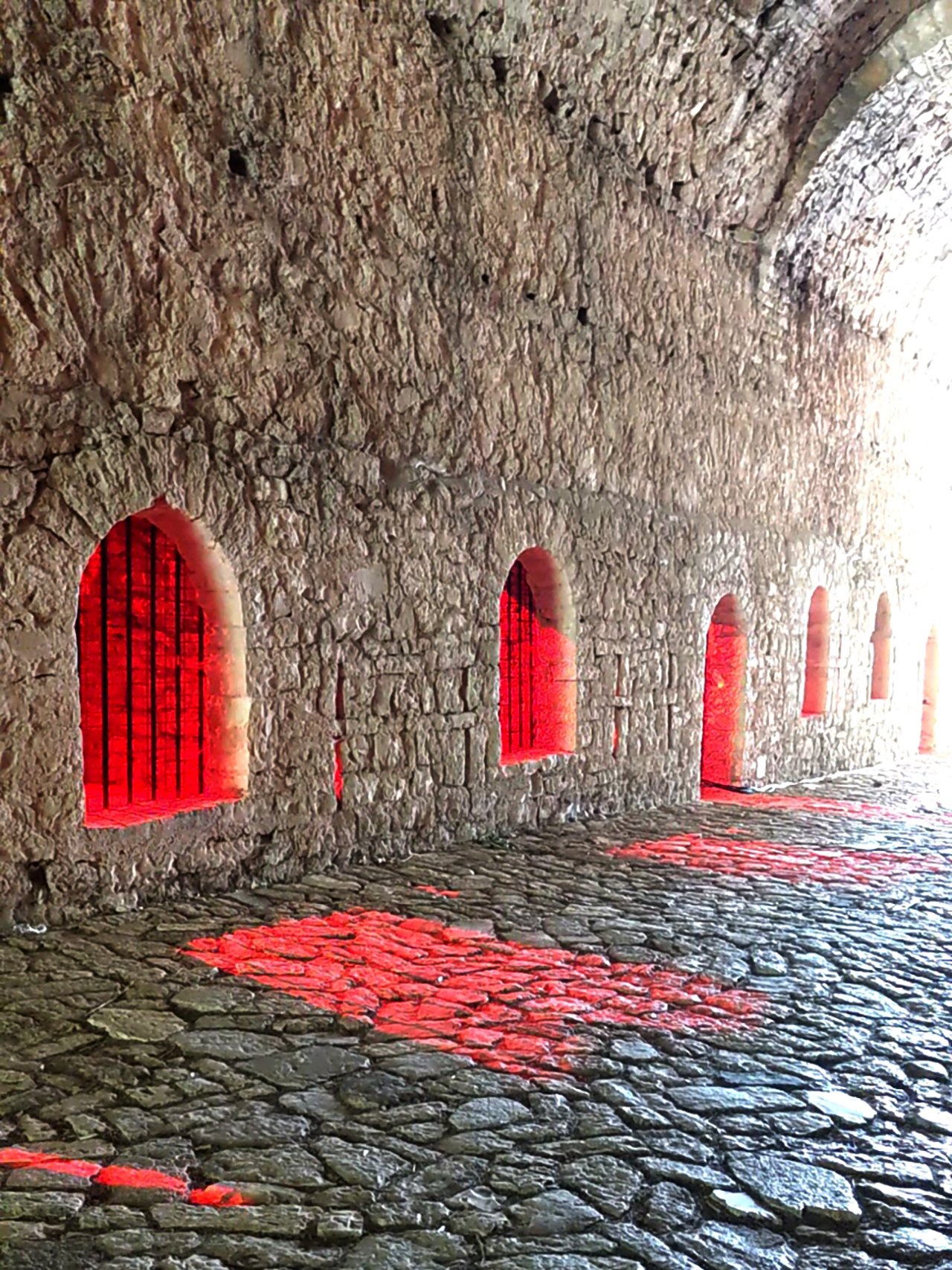
The Passing interior during daytime. Photo taken by Maenads.

The Passing interior. Photo by Pinelopi Gerasimou for Onassis Stegi (c).

The Passing interior. Photo by Pinelopi Gerasimou for Onassis Stegi (c).

The Passing interior. Photo by Pinelopi Gerasimou for Onassis Stegi (c).

The Passing interior. Photo by Pinelopi Gerasimou for Onassis Stegi (c).

The Passing interior. Photo by Pinelopi Gerasimou for Onassis Stegi (c).

The Passing interior. Photo by Pinelopi Gerasimou for Onassis Stegi (c).

The Passing interior. Photo by Pinelopi Gerasimou for Onassis Stegi (c).
Research and Process
The Passing was created through a four month-long remote collaboration, given that the members of the collective live in completely opposite parts of the world (Eleni is based in London, Aliki in Athens, and Afroditi in Seattle). What drew us to the topic of the lament and the chorus of voices was the initial motivation that we wanted to work in a very site specific manner, but also introduce elements of our research on algorithmic techniques, machine learning and speculative world-building:
The women of Epirus enjoy a special status among Greek women due to the rich history and tragic nature of the place — from the ancient deities that make women’s position in Epirus known, to the noblewomen of Souli and Zalogo, and the women of Pindus. The polyphonic lament of the women of Epirus (moiroloi) constitutes a fundamentally subversive act: to give voice to an otherwise marginalised and silenced group. This site specific sound installation will create a chorus of lamenters, performing a month long lament. Drawing on an archive of actual and speculative Epirotic laments, among other sonic material from the region of Ioannina, the installation will utilize current machine learning and voice synthesis technologies to create a space where past and future sorrows can be vocalized. In vocalizing them, this chorus made of human and nonhuman lamenters puts forth a radical idea: that tragedy is an incubator of possibility and joy, a fundamental hallmark of the experience of being a marginalized 'other'.
Our process included extensive research in the rich polyphonic song history of Epirus, and specifically the laments of the area of Pogoni (a province of villages at the Northern part of Epirus that borders Albania). After investigating online archives, radio shows dedicated to Epirotic lament, contacted local lamenters from Ioannina (via our local collaborator Dimitris Batsis), our breakthrough came after listening to the mesmerizing sounds of singer Fani Dimopoulou and watching the documentary A Song about Epirus - The Polyphonic Songs of Pogoni by P. Karkanevatos and L. Liavas. The intensity of emotion, the depth of meaning, the pain and joy shared through Pogoni’s polyphonic singing, was what ultimately made us seek a polyphonic group of the area and record them in order to create the archive that would lead to our sound composition.
In April 2023, we had the opportunity to record live in a studio in Athens a group of lamenters from the village Ktismata in Pogoni consisting of Anthoula Kotsou, Roula Rifouna, Stavroula Aidoni, Vangelis Kotsou and Nikos Menoudakis. The songs that were recorded where then transformed into an algorithmic sound composition through a custom GUI (graphical user interface) that was developed by our collaborator James Wenlock using SuperCollider.
In addition to the original recordings, we created synthetic laments with GPT-4 using the lyrics of the traditional laments, and then a pitch matching technique, text-to-speech, and a vocoder in SuperCollider, in an effort to multiply our archive with speculative laments that would extentuate the non-human aspect of AI interpretation and vocal chorus. A selected few of these synthetic laments ended up forming part of our algorithmic composition.
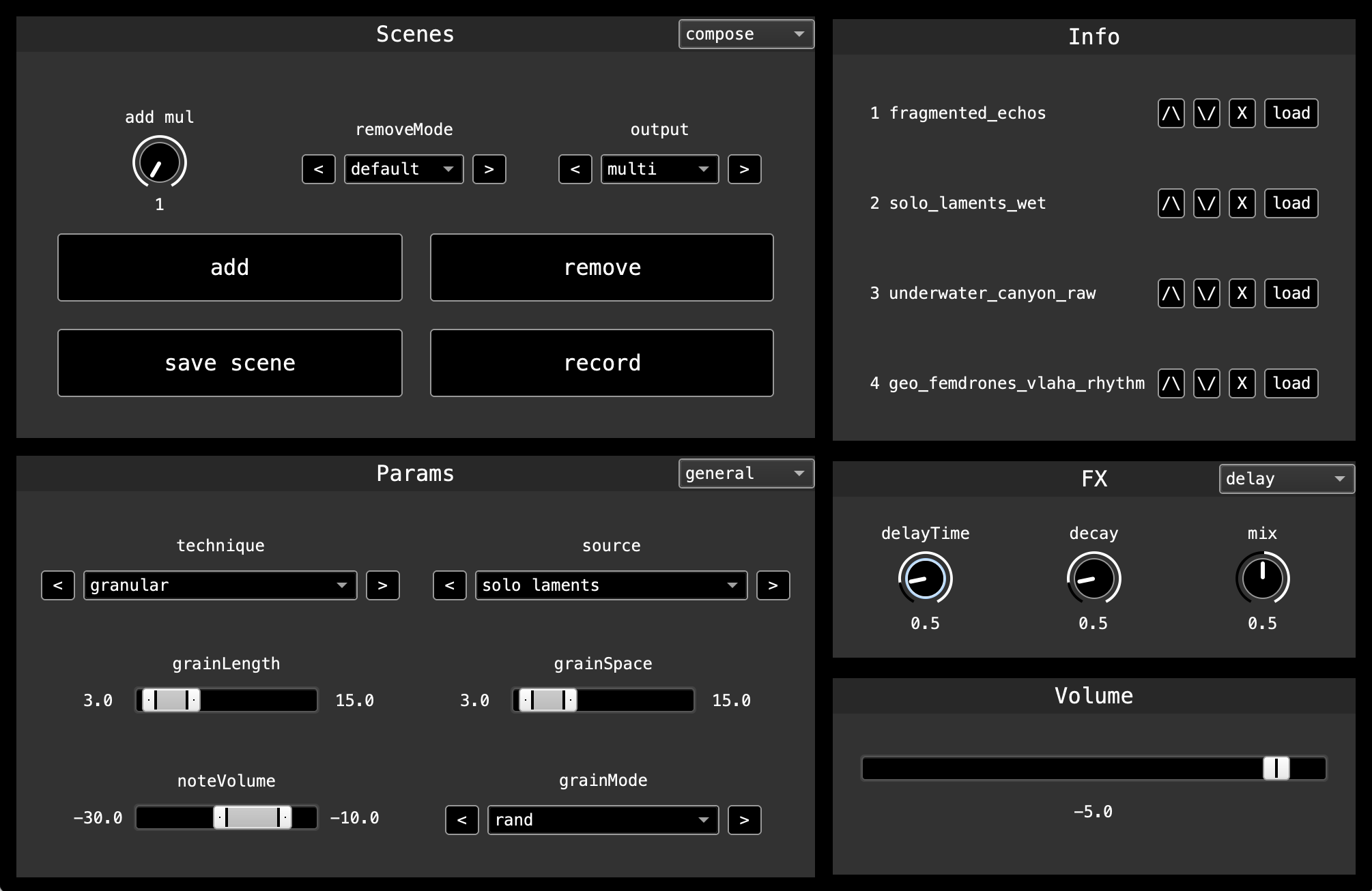
A snippet of our custom GUI for composing algorithmically. We used our samples (recorded and synthetic laments) and employed a granular and a convolution technique, as well as envelopes and FX to create a series of scenes that comprise of variable durations, and variable patterns.
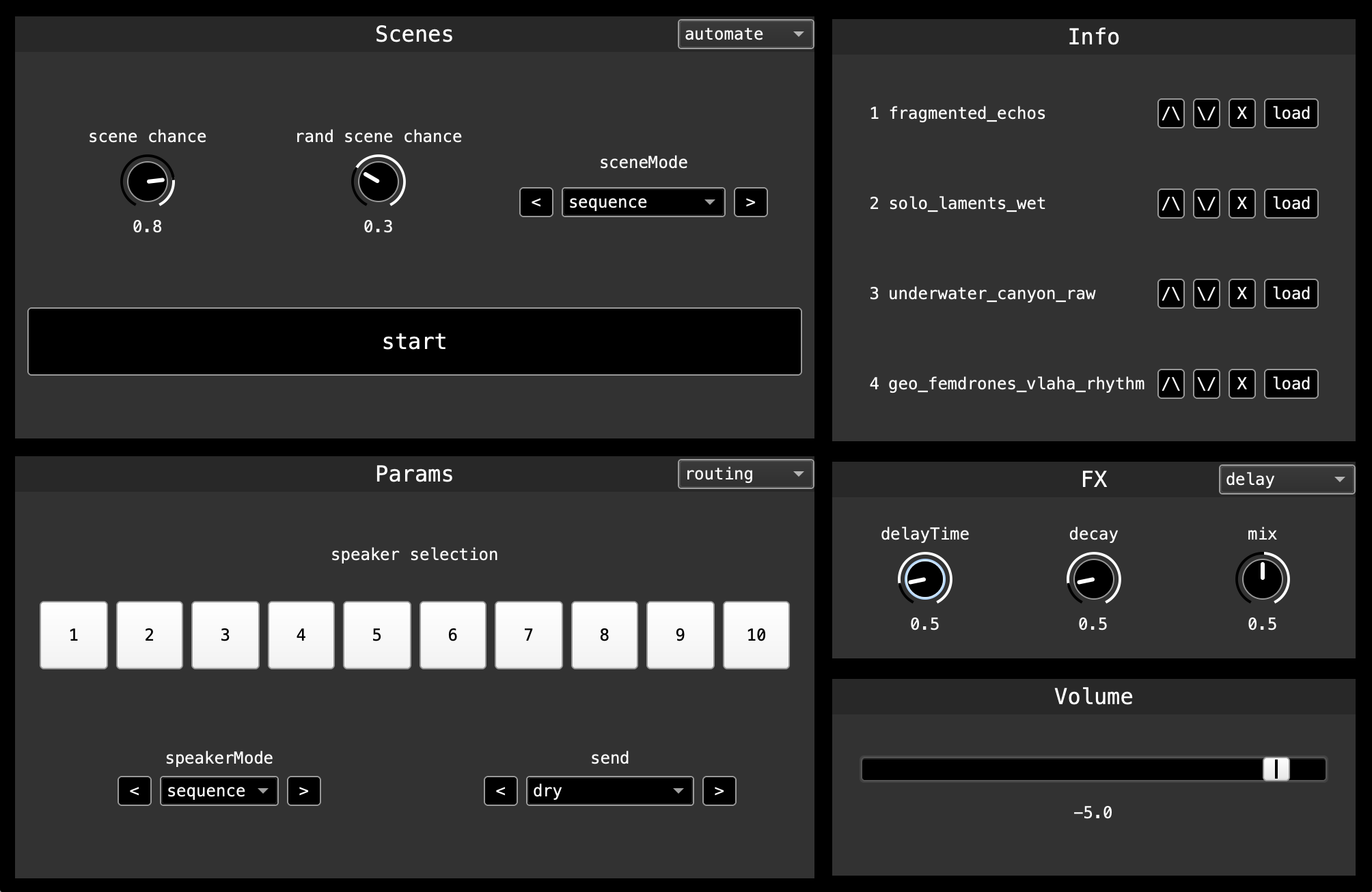
We composed for a total of 10 speakers meaning that some of our scenes are playing in sequence to all the speakers, while others are targeting very specific speakers, creating a polyphony of voices that expands in the tunnel of the installation and the audience's perception of the sound shifts depending on their position. For the playback, we used our scenes in sequence by introducing some randomness in the composition by using a 30% chance of scence change and an 80% chance of scene repetition. Therefore, the final composition is formed in an algorithmic manner, it is ever changing and never exactly repeatable.
Support
The Passing is made possible through the support of Onassis Stegi in the context the exhibition Plásmata II: Ioannina - Human, strange, digital, metaphysical.
Credits
Concept and composition: Maenads (Eleni Ikoniadou, Aliki Leftherioti and Afroditi Psarra).
Lamenters: Anthoula Kotsou, Roula Rifouna, Stavroula Aidoni, Vangelis Kotsou and Nikos Menoudakis
Software development: James Wenlock (SuperCollider)
Local collaborator: Dimitris Batsis
Acknowledgments
A huge thank you to the exhibition curators: Daphne Dragona, Prodromos Tsiavos, and Yorgos Tzitzilakis for all of their support through this process, as well as the light and sound technicians at the Onassis foundation for helping us bring this project to life.
Additional thank you to DXARTS for lending the DXARTS gallery and its equipment to prototype the multichannel sound installation, as well as the Art Faculty Fellows group at the University of Washington for providing valuable feedback in the development of the work.
Last but not least, a big thank you to Voltnoi and Quetempo from Movement Radio Athens for their continuous support and for instigating the creation of the Maenads collective.
Exhibitions
Plásmata II: Ioannina - Human, strange, digital, metaphysical, Ioannina, Greece. Organized by Onassis Stegi. Curated by Daphne Dragona, Prodromos Tsiavos, and Yorgos Tzitzilakis.
Conferences
Plásmata II Ioannina: Discussion Series, “Dimitris Hatzis” Cultural Centre (Old Slaughterhouse), Ioannina, Greece. Organized by Pasqua Vorgia for Onassis Stegi.
Panel discussion “Focusing on the Unseen: Plural Voice, Body in Absentia, and Machine Learning” with Maria Louizou, Afroditi Psarra, Maria Varela (artists). Moderated by Prodromos Tsiavos (Head of Digital and Innovation, Onassis Foundation).

